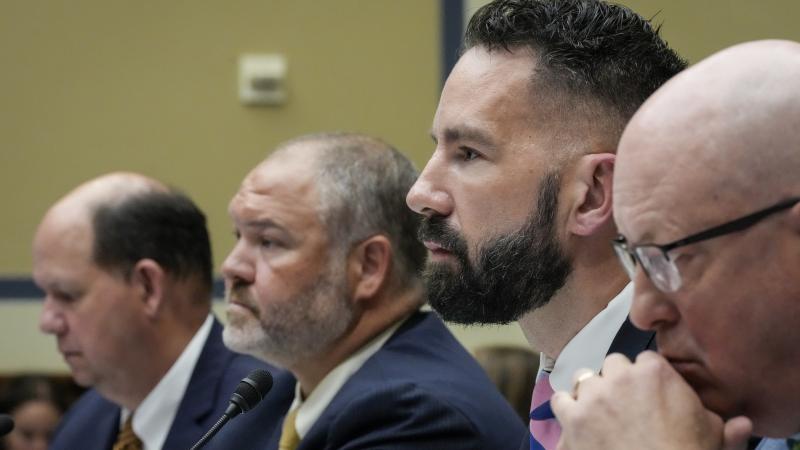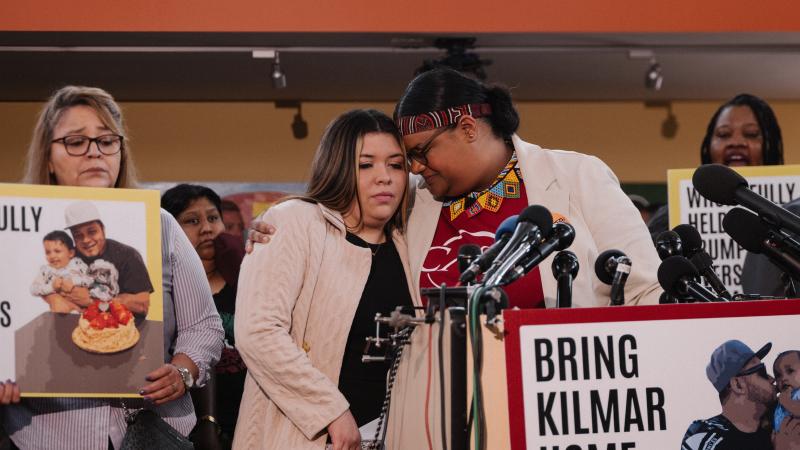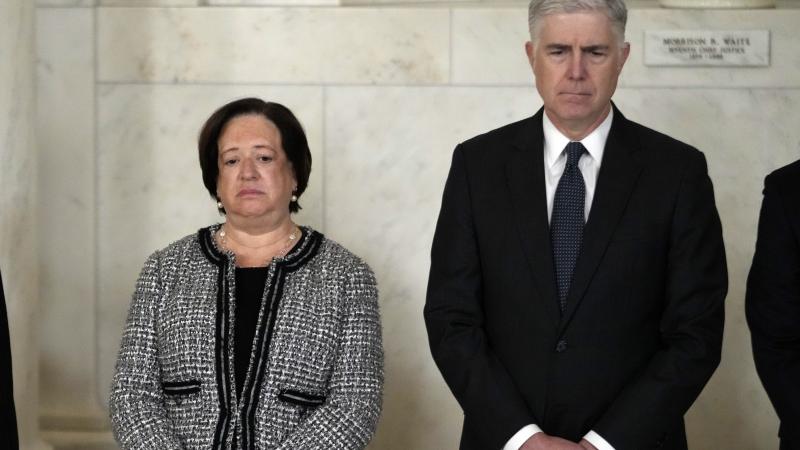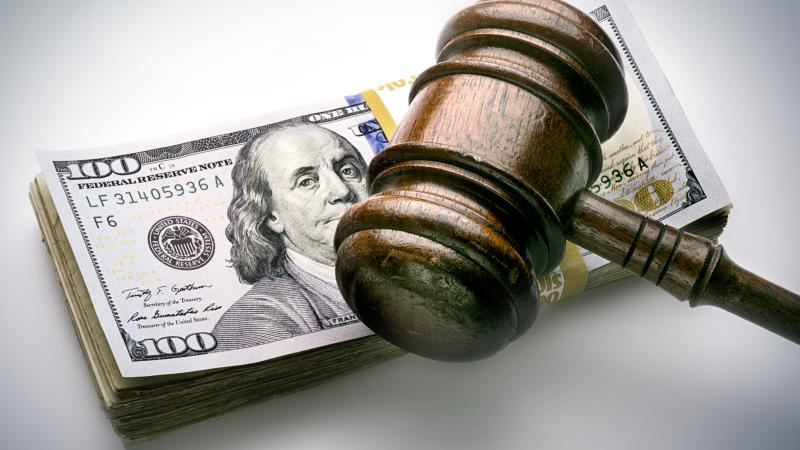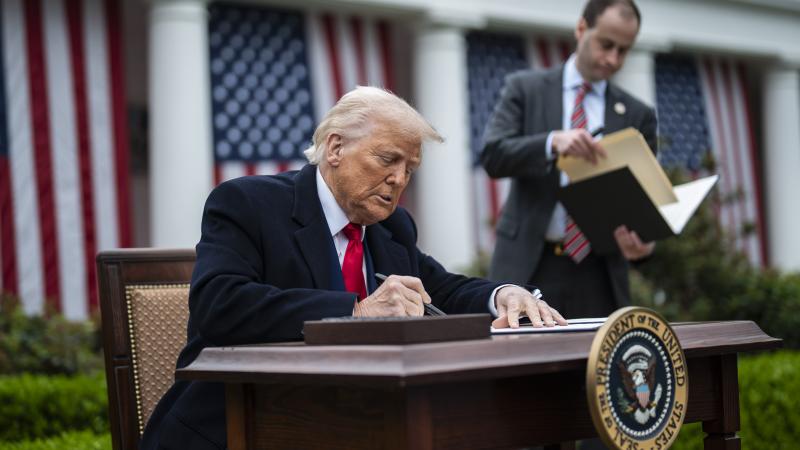Top prosecutor undercuts Garland, says Weiss needed DOJ approval to bring Hunter Biden tax charges
The attorney general testified Weiss had authority to bring charges on his own, but acting tax division chief says his office had to give approval to proceed.
The Justice Department's chief tax prosecutor has told Congress that Delaware U.S. Attorney David Weiss could not bring tax evasion charges against Hunter Biden without getting prior approval from his office, further undercutting Attorney General Merrick Garland's portrayal that the politically sensitive probe was completely independent.
In an transcribed interview with the House Judiciary Committee reviewed by Just the News, Acting Assistant Attorney General Stuart Goldberg, the current chief of the DOJ tax division, also acknowledged that Hunter Biden's case got special attention because of his father's political stature.
“Was the fact that Hunter Biden was involved here, did that require DOJ Tax’s signoff because it’s a sensitive matter?” a House investigator asked during the interview last week.
“Well, without getting into the case, again trying to answer a question at a slightly higher level, there are cases that are sensitive, people – some would say sensitive, sometimes say significant cases. And those cases typically have closer supervision than other, more run of the mill cases,” Goldberg answered.
Goldberg's account supports testimony from IRS whistleblowers Gary Shapley and Joseph Ziegler that DOJ treated the first's son tax case differently and that Weiss could not bring the charges against Hunter Biden without blessings from the tax division and the U.S. Attorneys in Washington D.C. and Los Angeles, where the alleged crimes occurred.
Both of those local prosecutors – Miguel Estrada and Matthew Graves – were Biden appointees and have already admitted they refused to partner with Weiss and bring charges against President Joe Biden's son.
Goldberg's interview is the latest evidence to surface to support House and Senate Republicans' efforts to challenge the the veracity of Garland's testimony earlier this year that Weiss had independent authority to bring Hunter Biden criminal charges, free of political interference.
“He has been advised he is not to be denied anything he needs,” Garland testified back in March. “I have not heard anything from that office to suggest that they are not able to do everything the U.S. Attorney wants to do.”
At the time he added that local federal prosecutors would not be allowed to thwart Weiss from bringing charges outside of Delaware. "[I]f it's in another district, he would have to bring the case in another district," Garland testified in March. "But as I said, I promise to ensure that he's able to carry out his investigation and that he'd be able to run it. And if he needs to bring it in another jurisdiction, he will have full authority to do that."
Ziegler and Shapley said Weiss' office ultimately dropped a plan to charge Hunter Biden with tax evasion dating to 2014 – including on some income from the Burisma Holdings firm in Ukraine – after Graves in Washington and Estrada in Los Angeles declined to partner. Weiss also allowed the statute of limitations to expire on those counts, the agents testified this summer. They also stated that DOJ's tax division had to give signoff for Weiss to bring any charges.
In his interview, Goldberg mostly backed up the agents, while declining into specific deliberations.
The DOJ did not immediately respond to a request for comment from Just the News.
Goldberg, a career federal prosecutor for 35 years, told the House committee he was kept apprised of and participated in deliberations on the Hunter Biden investigation. Goldberg told congressional investigators that no matter what authorities Weiss is granted – including special attorney status – he is still required to seek approval from the DOJ Tax Division before bringing any tax-related charges, the transcript reviewed by Just the News showed.
“We talked about earlier this morning that the final authority for prosecution or not of criminal matters arising under the Internal Revenue laws rest with the Tax Division, correct?” an investigator asked Goldberg.
“We have approval authority, though someone can appeal us if they disagree. But, yes, it’s our responsibility in the first instance to do that,” Goldberg answered.
Later, Goldberg testified that even if Weiss had received special authority, under what is known as a 515 letter, he would still have to seek approval through DOJ Tax. “Okay. And if someone if Mr. Weiss gets 515 authority, he would still be required to go through the Tax Division to get approval of tax charges. Is that correct?” an investigator asked.
“Yes,” Goldberg answered.
“Okay. So even if Mr. Weiss had been afforded special attorney status or special counsel status, he would still be operating within the Justice Department’s guidelines in the Justice Manual, correct?” the investigator followed up. “Yes,” Goldberg responded.
Goldberg also expounded on why Hunter Biden's case received special attention inside DOJ.
“If there’s a target of an investigation that has some political significance attached to him or her, is that – does that trigger any heightened review process within DOJ Tax?” investigators asked Goldberg.
“So if something can be termed as sensitive pursuant to the case it might be because it’s a public official or it’s a person that has a noteworthy profile or it’s going to generate a lot of media attention, or might be congressional interest,” he answered. “That might mean that the case would come to my level for ultimate signoff on the case as opposed to be handled at the chief’s level."
When asked if the Hunter Biden case fell into this category, Goldberg answered in the affirmative.
Goldberg was prevented by the Justice Department from answering many of the investigators’ substantive questions on the Hunter Biden investigation and charging decisions around the case, even if only tangentially related. DOJ lawyers cited now-special counsel Weiss’ “ongoing investigation.”
The questions surrounding Weiss’ authority to charge Hunter Biden with tax crimes first emerged when two IRS whistleblowers came forward claiming that the U.S. Attorney’s Office in Delaware and officials at DOJ Tax obstructed the investigation.
Shapley, one of the whistleblowers, testified to the House Ways and Means Committee this summer that, despite public assertions by Garland, Weiss had “ultimate authority” to bring charges, Weiss was denied authority by both the Central District of California and Washington, D.C. U.S. Attorneys to bring charges in their districts. Weiss has disputed the whistleblowers’ contention.
The whistleblowers also raised concerns about DOJ Tax Division’s insistence on approving specific interviews, “dragging their feet” during the investigation, and reversing course on its position on whether or not to indict Hunter Biden, according to Shapley’s testimony to Congress.
Shapley sent a prosecution recommendation to his colleagues on February 15, 2022, that DOJ Tax supported the team’s conclusion that “the elements of the violations recommended are beyond a reasonable doubt.”
“Based on discussions we have had with both parties, they support this investigation and are planning to indict,” he wrote in the memo.
You can read that memo below:
Later that year, at a June 15, 2022 meeting between the investigative team and DOJ officials, the DOJ Tax division allegedly changed their view, giving a presentation with the reasons not to proceed with charges. According to the Joseph Ziegler, the second IRS whistleblower, Stuart Goldberg was present at that meeting.
“So June 15th, 2022, the meeting with Stuart Goldberg, [Acting Deputy Assistant Attorney General]. The meeting with DOJ Tax at Main DOJ where the purpose of the meeting was misrepresented to the agents. We had no idea that they were going to bring up a huge presentation to everyone there regarding the reasons why we shouldn't charge this case,” Ziegler testified.
This latest testimony reinforces the claims made by the IRS whistleblowers that the DOJ Tax division was the one of the deciding authorities on the conduct of the investigation as well as in the ultimate decision on whether to bring charges.

